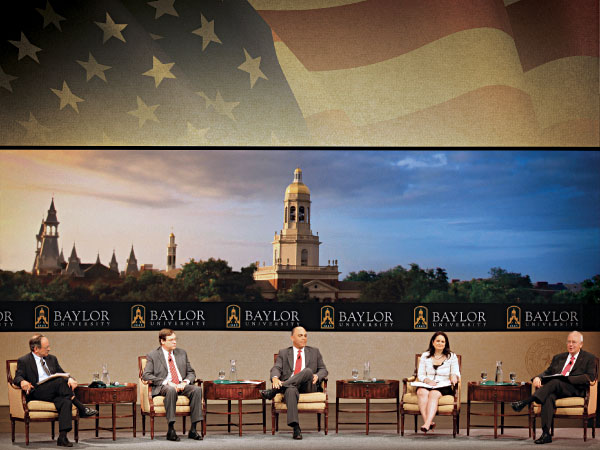Presidential Symposium: The Role Of The Supreme Court In American Society
In the first of a new Presidential Symposium Series to be hosted by Baylor, President Ken Starr served as moderator for a panel discussion featuring five prominent legal experts, including a pair of Baylor graduates, on "The Role of the Supreme Court in American Society."
Held in Waco Hall the morning of Starr's inauguration, Sept. 17, the panel featured Baylor alumni Thomas R. Phillips, BA '71, former Chief Justice of the Texas Supreme Court, and Jennifer Elrod<, BA '88, a federal judge on the Fifth Circuit Court of Appeals, as well as current Texas Supreme Court Chief Justice Wallace Jefferson and Newsweek contributing editor Stuart Taylor.
President Starr -- himself a former judge and U.S. Solicitor General, and the Louise L. Morrison Professor of Constitutional Law at Baylor -- began the hour-and-a-half discussion with a walk through the history of the Constitution and the Supreme Court in particular.
"It should come as no surprise that the American people tend to tune in when there's a confirmation hearing for the Supreme Court of the United States," he told the crowd of about 1,500. "Why is that? Because we the people care about who sits on the Supreme Court and the process by which justices on the Supreme Court are chosen. But the lion's share of litigation in the United States is actually handled not in the federal courts, but in the state courts."
The four panelists then each gave an overview of the differences between the federal and state court systems and how they relate to one another.
"When the federal constitutional convention met 223 years ago, the last issue they decided was how the federal judiciary should be chosen," noted Phillips. "Should they be elected by one or both houses of Congress? Should they be chosen by the President? Should there be some intermediary? They came up with a compromise; the President would nominate and the Senate would confirm."
In contrast, the 50 states use a variety of methods for selecting judges; in Texas, they are elected like other state officials.
"I think I'm the only one on the stage who's been appointed by a governor, then elected twice and nominated and confirmed by the Senate," said Elrod, who was appointed to her role on the Fifth Circuit in 2007 -- a position she has for life, if she so desires. "I'm delighted and honored to be here. The last time I was on this stage was when I was in college here, and I had the privilege of sitting next to President Herbert Reynolds during the all-university awards convocation. That was my very best memory of Baylor."
After each panelist had shared at length, Starr, as moderator, posed questions to the group that were submitted by members of the audience. Most had to do with Supreme Court justices balancing their own values while upholding the law as written and not overstepping into the realm of "judicial activism."
Six future speakers are scheduled throughout 2010-11 as the Presidential Symposium Series continues during Starr's first year in office, each speaking on higher education -- its future, the importance of Christian higher education, and other related topics.
